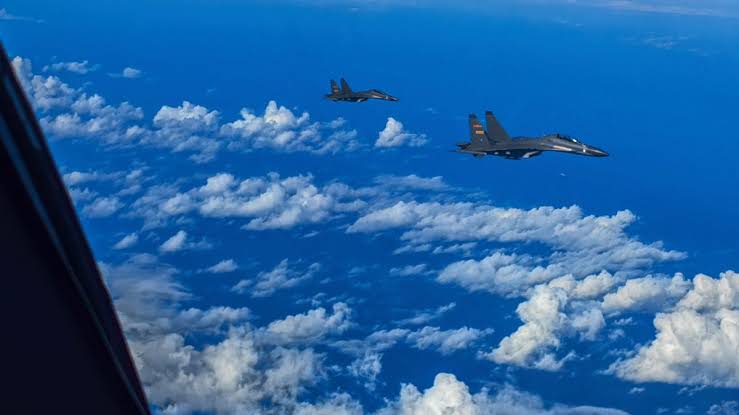What to make of the US military’s movements in the Pacific and a general’s wild warning about war

by Zachary B. Wolf
Fighter jets of the Eastern Theater Command of the Chinese People’s Liberation Army conduct joint combat training exercises around the island of Taiwan on August 7, 2022.
Multiple developments in recent weeks reinforce the US military’s new hyperfocus on China:
The US is beefing up its presence in the Pacific with a new military base – its first in 70 years – on the island of Guam, a US territory.
There is a new agreement between the US and Japan that will redesignate US Marines stationed on Japan, allowing them to fire anti-ship missiles.
Plus, the US military will gain expanded access to bases in the Philippines, a newly announced deal that drew US Defense Secretary Lloyd Austin to that country this week.
These military moves give the impression of resolve and focus that the US will help protect the democratic, self-governing island of Taiwan in the event of direct Chinese aggression.
China’s ruling Communist Party views Taiwan as part of its territory, despite never having controlled it, and has refused to rule out the use of military force to bring about what it calls “reunification.” The US provides Taiwan with defensive weapons but has remained intentionally ambiguous on whether it would intervene militarily in the event of a Chinese attack.
Top US officials such as Chairman of the Joint Chiefs Gen. Mark Milley have said US intelligence suggests China’s goal is to be able to strengthen its military capabilities to levels required to potentially attack and seize Taiwan by 2027, something which analysts believe it does not possess at present.
If you look at a map, the Philippines, where the US has expanded its existing access to bases, is just south of Taiwan. The Japanese island of Okinawa, where Marines are stationed, is to the north.
China’s military is gaining – its navy is bigger than the US Navy
Writing about the Marines on Okinawa, CNN’s team has reported that the Pentagon is certainly aiming to be ready for any conflict with China – noting “the Pentagon’s desire to shift from the wars of the past in the Middle East to the region of the future in the Indo-Pacific. The change comes as simulated war games from a prominent Washington think tank found that Japan, and Okinawa in particular, would play a critical role in a military conflict with China, providing the United States with forward deployment and basing options.”
The military labels China as a “pacing threat,” meaning its military is making strategic strides against the US. In fact, China’s navy has surpassed the US Navy in fleet size, and some experts have warned that an American technological advantage may not be enough to maintain superiority, particularly when the US is committing many of its munitions to Ukraine.
Global positioning
When American politicians such as President Joe Biden talk about this current time period as an era in which democracies must stand up to autocracies, he’s largely talking about China and Russia.
Secretary of State Antony Blinken travels to China this weekend to discuss a range of issues with Chinese officials.
Biden has angered the Chinese government by repeatedly saying out loud what has been the assumed part of US foreign policy – that the US would respond if China was to move militarily against Taiwan.
Warnings about China wanting to supplant the US as the dominant world power are not new.
In March 2021, Navy Adm. Philip Davidson, who at the time was in charge of US Indo-Pacific Command, told lawmakers on Capitol Hill that China could be aiming to topple the “rules-based international order” by 2050 or sooner and could pose a direct threat to Taiwan even earlier, by 2027.
That’s all geopolitical background with which to a view a memo from a top commander in the US Air Force, Gen. Michael Minihan, that warns subordinates his “gut” tells him to be ready for war with China – and not just in theory, but in two years.
The memo is out of step with the rest of the US government, fueling Republican criticisms of Biden and giving China reason to claim the US is the aggressor in the region.
Is this general being serious?
The memo, first reported by NBC News, was shocking because its inappropriate language and hard deadline not only presupposes that a war between the US and China is inevitable – something both Washington and Beijing maintain is inaccurate – but is wholly out of step with the much more diplomatic, public-facing language coming out of the White House, the State Department and pretty much anywhere else of military or diplomatic authority.
“I hope I am wrong. My gut tells me we will fight in 2025,” writes Minihan, the four-star general who oversees the Air Mobility Command, which controls transport and refueling.
Officials from the Pentagon and White House have distanced themselves from the memo and made clear that war with China is not preordained or even likely.
“The president believes it shouldn’t evolve into conflict,” John Kirby, the coordinator for strategic communications at the National Security Council, told CNN’s Wolf Blitzer on Monday. “There’s no reason for the bilateral relationship – the most consequential bilateral relationship in the world – to erupt into some kind of conflict. We do believe, and the president has made clear, that we are in a competition with China, a competition that he believes the United States is well poised to win.”
Minihan asks his commanders to report on their plans for a war with China by the end of February and encourages his personnel to use target practice to prepare for the challenge with “unrepentant lethality.” He says the upcoming 2024 presidential election in Taiwan could provoke China, and the upcoming presidential election in the US could distract Americans from the threat.
Domestic political focus on China
Minihan’s warning is getting a lot of attention in conservative media outlets, which are pushing for a major increase in defense spending, particularly to build up the US Navy to counter China.
A Wall Street Journal editorial, for example, hailed Minihan as a truth teller.
The House Foreign Affairs Committee chairman, Texas Rep. Michael McCaul, said on “Fox News Sunday” that he hopes Minihan is wrong: “I think he’s right, though, unfortunately.”
McCaul also took a political shot at Biden over his decision to remove US troops from Afghanistan.
“We have to be prepared for this,” McCaul said. “It could happen, I think, as long as Biden is in office projecting weakness.”
Republicans are looking to make China a focus after taking control of the US House of Representatives and have created a new congressional committee to focus on threats posed to the US by China. After a report that House Speaker Kevin McCarthy was planning to follow in his predecessor Nancy Pelosi’s footsteps and visit Taiwan, a Chinese Foreign Ministry spokesperson urged against US officials interacting with Taiwan, according to The Hill.
War is not at all inevitable
Former Defense Secretary Mark Esper, who worked for former President Donald Trump, said there is an important line between being prepared for the possibility of war and predicting one will definitely occur.
“On one hand, I think it’s very important to drive a sense of urgency. I applaud him for that. He’s an aggressive commander,” Esper told CNN’s Kate Bolduan on Monday, referring to Minihan’s memo. “On the other hand, I would not paint it as inevitable that we will be in war, and I hope we will do everything we can to deter a conflict.”




